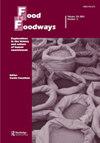反思:被抢走的共栖性:在法国新冠肺炎疫情期间,一起吃饭还是不一起吃饭
IF 1.1
Q2 ANTHROPOLOGY
引用次数: 7
摘要
摘要在新冠肺炎大流行期间,法国政府于2020年3月17日至5月11日实施了严格的封锁。这些非同寻常的时代挑战了普遍性的社会规范,这种做法在法国尤为强烈和根深蒂固。封锁对共享用餐习惯有何影响?共同性的规则和规范是如何经受住封锁导致的社会纽带削弱的?基于对20个社会多元化家庭的定性研究,本文提出了一种适应性共生饮食模式的类型:1)一起吃饭可以通过重现日常生活或制定饮食传统来提供保证;2) 篡改封锁规则会导致创造性的新形式的共同性,或者导致共同性的模仿;3) 与同一个人分享每顿饭可能会引发对相互指责做法的拒绝。这些模式也可能代表封锁经历的可能阶段,因为一些人从一种模式转移到另一种模式。论文的最后一部分讨论了通过共同性的视角突出的社会联系的本质。本文章由计算机程序翻译,如有差异,请以英文原文为准。
Reflection: Snatched Commensality: To eat or not to eat together in times of Covid-19 in France
Abstract During the Covid-19 pandemic, the French Government imposed a strict lockdown from March 17th to May 11th 2020. These extraordinary times challenged the social norm of commensality, a practice that is particularly strong and engrained in France. How has lockdown impacted meal-sharing habits? How have the rules and norms of commensality withstood the weakening of social bonds caused by lockdown? Based on a qualitative study of 20 socially diverse households, this essay proposes a typology of adaptive commensal eating patterns: 1) Eating together can provide reassurance by reproducing ordinary routines or by enacting food traditions; 2) Tinkering with lockdown rules leads to creative new forms of commensality, or to an ersatz of commensality; 3) Sharing every meal with the same people can trigger the rejection of commensal practices. These patterns may also represent possible phases in the experience of lockdown, since some individuals shifted from one pattern to another. The final part of the paper discusses the very nature of the social link highlighted through the lens of commensality.
求助全文
通过发布文献求助,成功后即可免费获取论文全文。
去求助
来源期刊

Food and Foodways
ANTHROPOLOGY-
CiteScore
2.20
自引率
0.00%
发文量
16
期刊介绍:
Food and Foodways is a refereed, interdisciplinary, and international journal devoted to publishing original scholarly articles on the history and culture of human nourishment. By reflecting on the role food plays in human relations, this unique journal explores the powerful but often subtle ways in which food has shaped, and shapes, our lives socially, economically, politically, mentally, nutritionally, and morally. Because food is a pervasive social phenomenon, it cannot be approached by any one discipline. We encourage articles that engage dialogue, debate, and exchange across disciplines.
 求助内容:
求助内容: 应助结果提醒方式:
应助结果提醒方式:


